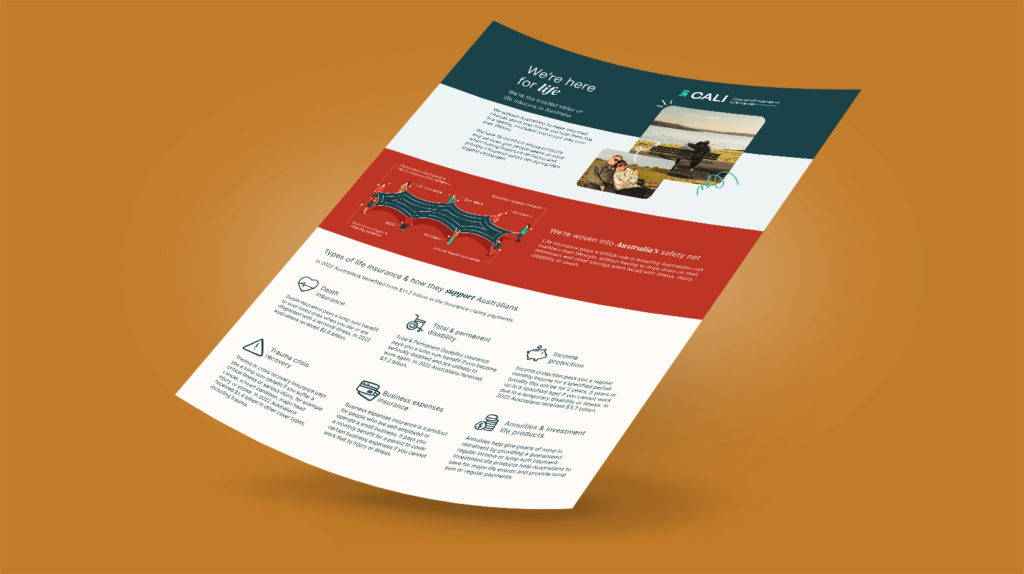Discover the
industry
The idea that Australians should be able to safeguard themselves throughout their lifetime has roots as far back as the goldrush.
The people exposed to dangerous work on the goldfields more than 170 years ago wanted protection for their families.
Life insurers have answered the call ever since. Today, millions of Australians rely on life insurance for peace of mind as they face life’s biggest decisions and challenges.
Whether you’re having a baby, taking out a mortgage, starting a business or planning for retirement, we’re here for you. The life insurance industry is central to the financial wellbeing and resilience of Australians and the broader community. It provides jobs, protects families and contributes to the national economy.
Life insurance matters. Your future matters.


What is life insurance?
Life insurance includes various types of insurance products designed to give you and your loved ones peace of mind and financial security in the event of your retirement, death, injury or major illness. Life insurance products may provide a lump sum payment or a regular income to help you and your family cover ongoing expenses such as living costs, mortgage payments, funeral costs and medical expenses.
Who are our members?
CALI’s members are life insurance companies (including reinsurers) registered with the Australian Prudential Regulation Authority. The 20 members of CALI represent all life insurers and reinsurers in Australia.
Common types of products
Learn more about the common types of life insurance products that CALI members provide. Some life insurers offer other kinds of risk protection products, including consumer credit insurance, funeral cover and accident and sickness insurance.
Death insurance
Death insurance pays a lump sum benefit to your loved ones when you die or are diagnosed with a terminal illness.
Total and Permanent Disability
Total & Permanent Disability insurance pays you a lump sum benefit if you become seriously disabled and are unlikely to work again.
Income protection
Income protection (also known as salary continuance insurance) pays you a regular monthly income for a specified period (usually this will be for 2 years, 5 years or up to a specified age) if you cannot work due to a temporary disability or illness.
Trauma crisis recovery
Trauma or crisis recovery insurance pays you a lump sum benefit if you suffer a critical illness or serious injury, for example cancer, a heart condition, major head injury or stroke.
Business expenses insurance
Business expenses insurance is a product for people who are self-employed or operate a small business. It pays you a monthly benefit for a period to cover certain business expenses if you cannot work due to injury or illness.
Annuities and investment life products
Annuities help give peace of mind in retirement by providing a guaranteed regular income or lump sum payment. Investment life products help Australians to save for major life events and provide lump sum or regular payments.
Customer guides
The life insurance industry has developed customer guides to help you understand life insurance products including how you pay for your policy, the consumer protections in place, your rights and responsibilities, and how you can make a claim, a complaint or cancel your policy.
It is important to note that insurers have changed premium label descriptions for new retail advised business. Read more in our life insurance premiums fact sheet here.
Read our customer guide to life insurance law here.
Life Insurance Code of Practice
The life insurance industry has voluntarily developed the Life Insurance Code of Practice (Life Code) to protect Australian customers.
The Life Code establishes important standards which life insurers must comply with to guarantee that customers can confidently purchase life insurance, knowing that their insurer will provide assistance when needed.
The Life Code encompasses all aspects of life insurance, including how products are designed, how they are sold, timeframes to communicate decisions with customers, the claims process and how complaints resolved. It includes additional commitments made by participating life insurers to consumers, going beyond what is legally mandated and has important protections for customers who are vulnerable, require financial assistance or who experience a mental health condition.
The Life Code can be viewed here.

Life insurance by numbers
View the life insurance fact book
The Australian life insurance fact book provides statistics and information about trends in the life insurance industry.

